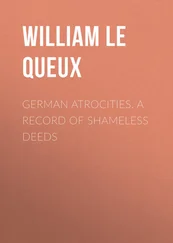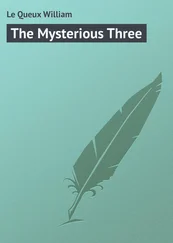William Le Queux - As We Forgive Them
Здесь есть возможность читать онлайн «William Le Queux - As We Forgive Them» — ознакомительный отрывок электронной книги совершенно бесплатно, а после прочтения отрывка купить полную версию. В некоторых случаях можно слушать аудио, скачать через торрент в формате fb2 и присутствует краткое содержание. Жанр: foreign_prose, на английском языке. Описание произведения, (предисловие) а так же отзывы посетителей доступны на портале библиотеки ЛибКат.
- Название:As We Forgive Them
- Автор:
- Жанр:
- Год:неизвестен
- ISBN:нет данных
- Рейтинг книги:3 / 5. Голосов: 1
-
Избранное:Добавить в избранное
- Отзывы:
-
Ваша оценка:
- 60
- 1
- 2
- 3
- 4
- 5
As We Forgive Them: краткое содержание, описание и аннотация
Предлагаем к чтению аннотацию, описание, краткое содержание или предисловие (зависит от того, что написал сам автор книги «As We Forgive Them»). Если вы не нашли необходимую информацию о книге — напишите в комментариях, мы постараемся отыскать её.
As We Forgive Them — читать онлайн ознакомительный отрывок
Ниже представлен текст книги, разбитый по страницам. Система сохранения места последней прочитанной страницы, позволяет с удобством читать онлайн бесплатно книгу «As We Forgive Them», без необходимости каждый раз заново искать на чём Вы остановились. Поставьте закладку, и сможете в любой момент перейти на страницу, на которой закончили чтение.
Интервал:
Закладка:
Could it be from Blair, I wondered?
“What was the character of the handwriting on the envelope?” I inquired.
“An English hand – thick and heavy. Signore was spelt wrongly, I noticed.”
Blair’s hand was thick, for he generally wrote with a quill. I longed to examine it for myself.
“Then this old serving-woman has no idea of the individual’s address?”
“None whatever. He told her that if any one ever called for him to say that his movements are uncertain, and that any message must be left in writing.”
“What is the place like?”
“Poorly furnished, and very dirty and neglected. The old woman is nearly blind and very feeble.”
“Does she describe him as a gentleman?”
“I could not ask her for his description, but from inquiries in other quarters I learned that he was in all probability a person who was in trouble with the police, or something of that sort. A man who kept a wine-shop at the end of the street told me in confidence that about six months before, two men, evidently agents of police, had been very active in their inquiries concerning him. They had set a watch upon the house for a month, but he had not returned. He described him as, a middle-aged man with a beard, who was very reticent, who wore glasses, spoke with just a slight foreign accent, and who seldom entered any wine-shop and who scarcely ever passed the time of day with his neighbours. Yet he was evidently well off, for on several occasions, on hearing of distress among the families living in that street, he had surreptitiously visited them and dispensed charity to a no mean degree. Apparently it is this which has inspired respect, while, in addition, he seems to have purposely surrounded his identity by mystery.”
“With some object, no doubt,” I remarked.
“Certainly,” was the queer old man’s response. “All my inquiries tend to show he is a man of secrecy and that he is concealing his real identity.”
“It may be that he keeps those rooms merely as an address for letters,” I suggested.
“Do you know, signore, that is my own opinion?” he said. “He may live in another part of Florence for aught we know.”
“We must find out. Before I leave here it is imperative that I should know all about him, therefore I will assist you to watch for his return.”
Babbo shook his head and fingered his long cigar, which he was longing to smoke.
“No, signore. You must not appear in the Via San Cristofana. They would note your presence instantly. Leave all to me. I will employ an assistant, and we shall, I hope, before long be shadowing this mysterious individual.”
Recollecting that strange letter in Italian which I had secured from the dead man’s effects, I asked the old fellow if he knew any place called San Frediano – the place appointed for the meeting between the man now dead and the writer of the letter.
“Certainly,” was his reply. “There is the market of San Frediano behind the Carmine. And, of course, there is the Church of San Frediano in Lucca.”
“In Lucca!” I echoed. “Ah, but it is not Florence.”
Nevertheless, now I recollected, the letter distinctly appointed the hour of meeting “at vespers.” The place arranged was therefore most certainly a church.
“Do you know of any other Church of San Frediano?” I inquired.
“Only the one in Lucca.”
It was evident, then, that the meeting was to take place there on the 6th of March. If I did not ascertain any further facts concerning Paolo Melandrini in the meantime, I resolved to keep the appointment and watch who should be present.
I gave Carlini permission to smoke, and, seated in a low easy-chair, the old fellow soon filled my room with the strong fumes of his cheap cigar, at the same time relating to me in narrow details all that he had gathered in that Florentine slum.
The secret connexion between Burton Blair and this mysterious Italian was a problem I could not solve. There was evidently some strong motive why he should appoint him controller of Mabel’s fortune, yet it was all an utter enigma, just as much as the mysterious source from which the millionaire had obtained his vast wealth.
Whatever we discovered I knew that it must be some strange revelation. From the first moment I had met the wayfarer and his daughter, they had been surrounded by striking romance, which had now deepened, and become more inexplicable by the death of that bluff, hearty man with a secret.
I could not help strongly suspecting that the man Melandrini, whose movements were so mysterious and suspicious, had had some hand in filching from Blair that curious little possession of his which he had, in his will, bequeathed to my keeping. This was a strange fancy of mine, and one which, try how I would, I could not put aside. So erratic seemed the man’s movements that, for aught I knew, he might have been in England at the time of Blair’s death – if so, then the suspicion against him was gravely increased.
I was feverishly anxious to return to London, but unable yet to do so ere my inquiries were completed. A whole week went by, and Carlini, employing his son-in-law, a dark-haired young man of low class, as his assistant, kept vigilant watch upon the house both night and day, but to no avail. Paolo Melandrini did not appear to claim the letter from England that was awaiting him.
One evening by judiciously bribing the old servant with twenty francs, Carlini obtained the letter in question, and brought it for me to see. In the privacy of my room we boiled a kettle, steamed the flap of the envelope, and took out the sheet of notepaper it contained.
It was from Blair. Dated from Grosvenor Square eighteen days before, it was in English, and read as follows: —
“I will meet you if you really wish it. I will bring out the papers with me and trust in you to employ persons who know how to keep their mouths shut. My address in reply will be Mr John Marshall, Grand Hotel, Birmingham.
“B.B.”The mystery increased. Why did Blair wish for the employment of persons who would remain silent? What was the nature of the work that was so very confidential?
Evidently Blair took every precaution in receiving communications from the Italian, causing him to address his letters in various names to various hotels whither he went to stay a night, and thus claim them.
Mabel had often told me of her father’s frequent absences from home, he sometimes being away a week or fortnight, or even three weeks, without leaving his address behind. His erratic movements were now accounted for.
Consumed by anxiety I waited day after day, spending hours on that maddening cipher on the playing-card, until, on the morning of the 6th of March, Carlini having been unsuccessful in Florence, I took him with me up to the old city of Lucca, which, travelling by way of Pistoja, we reached about two o’clock in the afternoon.
At the Universo I was given that enormous bedroom with the wonderful frescoes which was for so long occupied by Ruskin, and just before the Ave Maria clanged away over the hills and plains, I parted from Babbo and strolled tourist-wise into the magnificent old mediaeval church, the darkness of which was illuminated only by the candles burning at the side altars and the cluster before the statue of Our Lady.
Vespers were in progress, and the deathlike stillness of the great interior was only broken by the low murmuring of the bowed priest.
Only about a dozen persons were present, all of them being women – all save one, a man who, standing back in the shadow behind one of the huge circular columns, was waiting there in patience, while of the others all were kneeling.
Turning suddenly on hearing my light footstep upon the marble flags, I met him next second face to face.
Читать дальшеИнтервал:
Закладка:
Похожие книги на «As We Forgive Them»
Представляем Вашему вниманию похожие книги на «As We Forgive Them» списком для выбора. Мы отобрали схожую по названию и смыслу литературу в надежде предоставить читателям больше вариантов отыскать новые, интересные, ещё непрочитанные произведения.
Обсуждение, отзывы о книге «As We Forgive Them» и просто собственные мнения читателей. Оставьте ваши комментарии, напишите, что Вы думаете о произведении, его смысле или главных героях. Укажите что конкретно понравилось, а что нет, и почему Вы так считаете.












